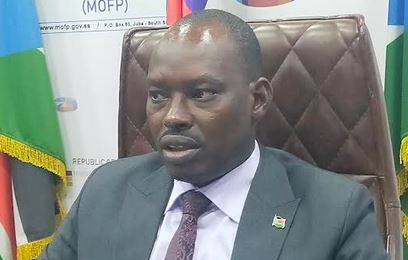South Sudan presented its first Voluntary National Review (VNR) report on Sustainable Development at the U.N. High-Level Political Forum (HLPF) in New York on 16, July 2024.
The VNR assesses the progress the country has made in implementing its 2030 Agenda for Sustainable Development.
Addressing journalists at a press conference on Tuesday, Dr. Marial Dongrin Ater, the newly appointed Minister of Finance and Planning, said the presentation of the VRN report demonstrates the country’s commitment to implementing the 2030 agenda on Sustainable Development.
“Dear South Sudan citizens, I have the pleasure to announce that today, 16 July 2024, South Sudan is presenting its first Voluntary National Review (VNR) on Sustainable Development at the UN High-Level Political Forum in New York,” he said. “Our country’s presentation at HLPF demonstrates a commitment to the implementation of the 2030 agenda on sustainable development.”
Dongrin said the country presented to the member states its achievements, challenges, and opportunities in the implementation of the Sustainable Development Goals since their adoption in 2015.
He said the VNR report provides government, development partners, and stakeholders the opportunity to collectively reflect on progress made and challenges faced on the road to achieving SDGs.
“At the 2024 Voluntary National Review Presentation, South Sudan will present to the Member States its achievements, challenges, and opportunities in the implementation of the Sustainable Development Goals since their adoption in 2015,” the minister revealed. “We will also have the opportunity to learn lessons and best practices from the other presenting countries. I would like to congratulate South Sudanese on some progress made based on the Voluntary National Review Report findings.”
On 24 June 2024, the Ministry of Finance and Planning reviewed the Voluntary National Review (VNR) 2024 report on the Sustainable Development Goals (SDGs).
The report will focus on SDG 2 on Zero Hunger, 3 on Good Health and Well-being, SDG 4 on Quality Education, SDG 13 on Climate Action, and 16 on Peace, Justice, and Strong Institutions, with a special emphasis on how these goals contribute to poverty reduction (SDG 1).
It also focuses on SDG 5 on Gender and Equality which will be considered as cross-cutting, and depending on data availability, as well as SDG 8 which talks about decent work and economic growth, and SDG 9 on Industry, Innovation, and Infrastructure.
“I would like to congratulate South Sudanese on some progress made based on the VNR Report findings. The relative peace and recovery due to the implementation of RARCSS, and mainstreaming of SDGs in our different plans and policies, reduced maternal mortality from 2,054 deaths per 100,000 (2006) to 1,223 per 100,000 (2023) and increased adult literacy rates by 7.52 percent from 26.98 percent (2008) to 34.5 percent (2022), among others,” he said. “We have enormous challenges that require our collective effort to overcome the worsening poverty levels and deteriorating food security situation exacerbated by protracted conflict, climate changes, Sudan’s civil war, and ongoing economic crisis remain to be addressed.”
Minister Dongrin concluded: “I call upon our collective action as government, donors, development partners, and citizens of South Sudan to accelerate progress on Sustainable Development Goals to enhance a better future for all South Sudanese.”




